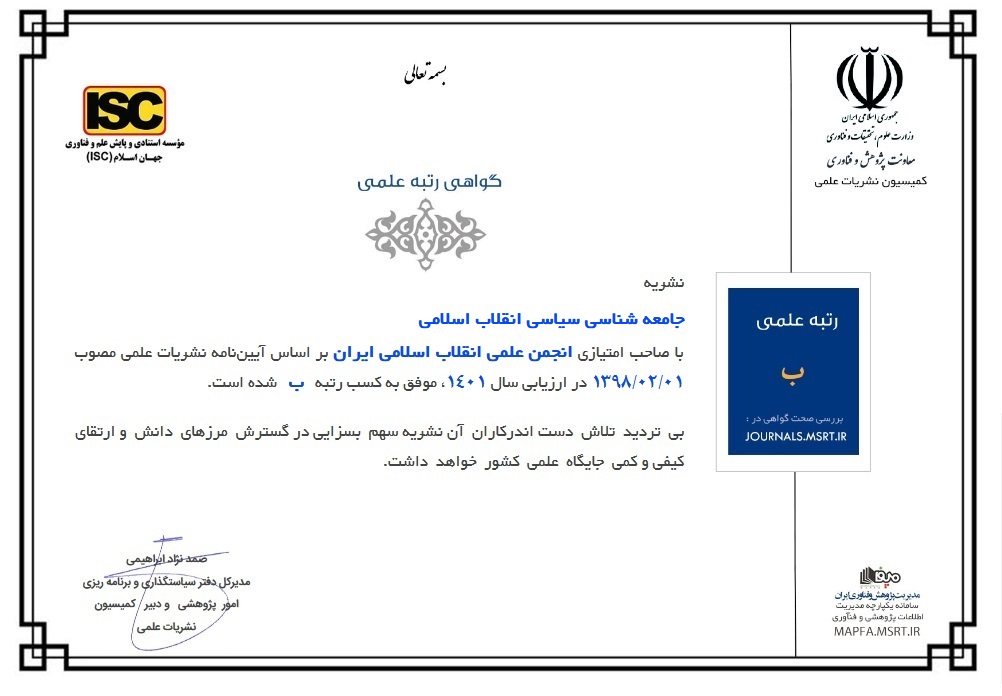نوع مقاله : مقاله پژوهشی
نویسنده
استادیار گروه الهیات فقه و حقوق اسلامی، دانشگاه پیام نور، تهران، ایران
چکیده
هر بازیگر در عرصه روابط بینالملل، دارای چارچوب و الگوی خاص و منطق درونی تعریف شده خاص خویش، برای فعالیت در میدان سیاست خارجی است. در این مقاله تلاش شده به بررسی این سوال مهم پرداخته شود که مولفههای فقه سیاسی در حوزه سیاست خارجی کدام است و آثار این مولفهها در سیاست خارجی بر اساس بیانیه گام دوم انقلاب اسلامی چگونه قابل تحلیل است؟ مقاله پیش رو توصیفی تحلیلی بوده و با استفاده از روش کتابخانهای به بررسی سوال مورد اشاره پرداخته است. یافتهها بر این امر دلالت دارد که فقه سیاسی تعریفکننده الگویی است در قالب اسلام سیاسی، که در روابط بینالملل بهعنوان یک نظریهی اسلامی مطرحشده است. اساساً فقه سیاسی پاسخهای دین به معضلات سیاسی جامعه نیز تعریف شده است. بنابراین در جامعه سیاسی شکل گرفته بعد از انقلاب، در چارچوب حکومت اسلامی، سیاست خارجی متاثیر مولفههای فقه سیاسی در این زمینه است. قاعده نفی سبیل، عدالت محوری، حمایت از مسضعفین، استقلال و خودکفایی و عد اعتماد به دشمنان از مهمترین مولفههای فقه سیاسی در سیاست خارجی است. آثار مولفههای مورد اشاره به صورت، استکبارستیزی و مقابله با نظام تکقطبی، مرزبندی با دشمن، دفاع از نهضتهای آزادیبخش و محور مقاومت، صدور انقلاب اسلامی و حمایت از بیداری اسلامی، صلحدوستی بینالمللی، ضدیت با استکبار و حفظ استقلال، عدم هراس از تهدیدات دشمنان و توجه به مصلحت در بیانیه گام دوم نمود داشته است.
کلیدواژهها
عنوان مقاله [English]
Rethinking political jurisprudence in the field of foreign policy based on the statement of the second step of the Islamic revolution
نویسنده [English]
- Yaghoub Alizadeh
Assistant Professor, Department of Theology, Islamic Jurisprudence and Law, Payame Noor University, Tehran, Iran
چکیده [English]
Each actor in the field of international relations has a specific framework and model and a defined internal logic for his activity in the field of foreign policy. In this article, an attempt has been made to examine the important question of what are the components of political jurisprudence in the field of foreign policy and how can the effects of these components be analyzed in foreign policy based on the statement of the second step of the Islamic revolution? The following article is descriptive and analytical and has investigated the mentioned question using the library method. The findings indicate that political jurisprudence is a defining model in the form of political Islam, which has been proposed as an Islamic theory in international relations. Basically, political jurisprudence is also defined as the answers of religion to the political problems of society. Therefore, in the political society formed after the revolution, in the framework of the Islamic government, foreign policy is influenced by the components of political jurisprudence in this field. The principle of negation of the mustache, central justice, support for the weak, independence and self-sufficiency, and distrust of enemies are among the most important components of political jurisprudence in foreign policy. The effects of the mentioned components are anti-arrogance and confrontation with the unipolar system, demarcation with the enemy, defense of liberation movements and axis of resistance, issuing the Islamic revolution and supporting Islamic awakening, international pacifism, anti-arrogance and preserving independence, not fearing threats from enemies.
کلیدواژهها [English]
- Political jurisprudence
- foreign policy
- statement of the second step
- Islamic revolution

